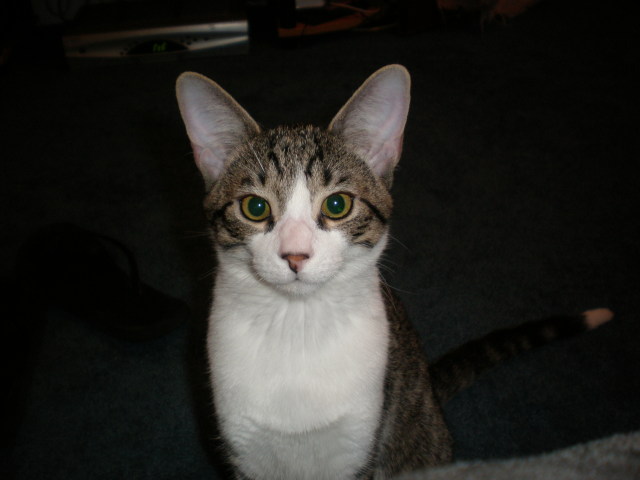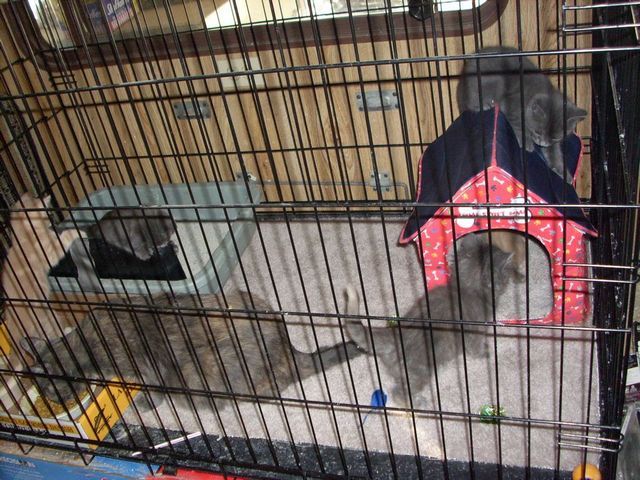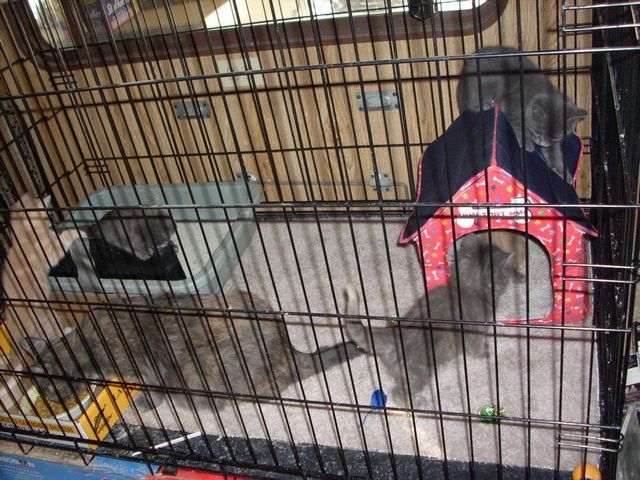QuestionI have some feral kittens about 3 months old.We have won over the trust of one of them but the other 2 are still so scared and wont let us touch them.We need some pointers.If the other two see that one of them is trusting us will the other two finally get tamer .
AnswerRadie,
It can take MONTHS for the kittens to trust you. Distrust of humans is inbred and inherited.
Cats that are feral, from feral mothers, or by feral fathers are not like regular domesticated housecats and you cannot expect them to behave in the same way. It takes a LOT of time and patience to work with them. Let them take things at their own pace. They will get better as they get more courageous. Most times they will be tame or bond only to the person working with them and feeding them and will be skittish or wild with others.
I have some feral "kittens" I have had since birth. Even at a year and a half old, if they hear strange noises, or see a person (even me until they hear my voice) they are gone! One runs under the bed and hides for an hour or more! They are VERY loving, but I still can't hold them for more than two minutes before they squirm away.
Ferals also bite when they get mad, want attention, get frightened, suddenly grabbed, etc. You need to stop them from doing it early. Mine know not to bite, but every once in a while one will still do it.
Ferals can be very loving, follow you around, and sleep next to you BUT they DO NOT like to be held or petted for very long. When you can pet them, do it only briefly. They do not like it for very long. Watch their tails and ears. If their tails wag or ears go back stop NOW.
They are quick to swat at you also until they completely are trusting of you. Do not come at them with your hand from the front to pet them, that can get you swatted. They swat first and think after. It's the self-preservation in them. Always pet from behind the head. Shoulder blades are a favorite pet spot for them. Do not stare at them directly in the eye, that is a threatening gesture. You can look them in the eye only if you slowly blink your eyes at them, or look away. That is a sign of being a friend and not foe...a friendly gesture.
You need to be careful about the tone of your voice with them. NEVER yell at them...and NEVER hit them. They are VERY sensitive and it is VERY easy to undo any progress you have made. When that happens it is VERY difficult to gain their trust again if they lose it. Their trust of humans is fragile. Training them is easier though because of the voice control. They immediately know what you don't like and won't accept by the tone of your voice.
Yes, they will learn about humans from watching another kitten. It is not unusual for a kitten (or cat) to sit and stare without blinking, watching every move you make with another kitten.
Food is the key to taming. It also associates you with something pleasant. Treats like tuna, tinned sardines with oil, pieces of raw beef, etc. are favorites. Especially something they can easily grab and run with if necessary. The kittens may hesitate to eat in your presence at first, but be patient. Put their food out then sit back quietly, speaking gently to them. Keep moving the food closer to you over a period of time until the food is right next to you and they trust you enough to eat it.
Then you can start touching. Be careful of making sudden moves....remember they are very skittish. How soon you begin handling the kitten depends on the kitten. The more often kittens are handled, the more likely they are to be socialized. Feral kittens will hiss, growl, and swat. Do not be deterred. Also the kittens can have different fathers (even from the same litter) so they may not all act or behave the same. Once you can touch them you are on your way!
Healthy ferals kittens are playful. They are also hunters and enjoy being able to do it. They will instinctively chase a string. Giving them a raw beef rib bone periodically as a treat (I have the butcher cut them in half) satisfies the "fresh kill' instinct, plus the fibers help clean their teeth. You should give them things to 'hunt' as they get older...like stuffed toy mice, little crafts balls that you can throw (ALL my feral kittens 'retrieve' when I throw them), or a pet laser light (from Petco, PetSmart, etc.) so they can chase the little red 'bug' on the ground. It is funny to watch them, it is a great interactive toy between you and the kittens because you can play with them without physical contact which will help them develop trust, and it helps you bond with them.
Try to get them fixed when you can catch them, that will help too.
Copy and paste, or type, this link into your address bar. It is a listing of LOTS of feral websites that have TONS of information about ferals:
http://www.theanimalspirit.com/feralcatlinks.doc
I hope this gives you some insight on how to work with feral kittens. Take your time. And the more time you spend around them the better. Some ferals don't ever trust humans and can not be tamed, but you have their age in your favor when they are young. Ferals take a lot of time, patience, and love to overcome their natural fear of humans...but the end result is heartwarming and satisfying.
It is nice what you are doing with the kittens. Bless you! There are SO very, very many feral kittens dying everyday scared, alone, sick, hurt, cold, and hungry...without ever having a chance to catch their first mouse. The poor things never had, and never will, have a chance to know anything different. It's wonderful when you, and caring people like you, help them out. It's also wonderful what the feral organizations are doing to try to help this sad, on-going situation.
Tabbi

 I dont understand my cat!
QuestionOliver
QUESTION: In January 2009 I got a
I dont understand my cat!
QuestionOliver
QUESTION: In January 2009 I got a
 help me understand please!
Questionhow can i make my 5 month old male kitten and m
help me understand please!
Questionhow can i make my 5 month old male kitten and m
 Angry kitten
QuestionI just adopted a young cat. Shes very young, an
Angry kitten
QuestionI just adopted a young cat. Shes very young, an
 Angry cat follow up
QuestionQUESTION: Dear Tabbi,
A few days ago, a friend
Angry cat follow up
QuestionQUESTION: Dear Tabbi,
A few days ago, a friend
 New Kitten
QuestionCat litter in kitchen
QUESTION: I adopte
New Kitten
QuestionCat litter in kitchen
QUESTION: I adopte